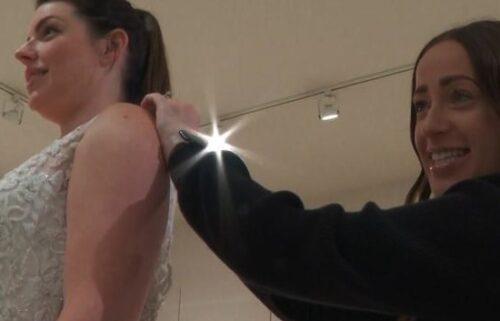Jewish students, profs, upset school starts on Rosh Hashanah
By Kelly Meyerhofer
Click here for updates on this story
MADISON, Wisconsin (madison.com/Wisconsin State Journal) — The University of Wisconsin System campuses that inadvertently scheduled the first day of fall classes on Rosh Hashanah are moving ahead with the same start date despite calls from Jewish leaders and more than a dozen faith groups to change it.
The decision puts Jewish students and instructors in the awkward position of choosing between education and religion. It’s a conflict they say has always been baked into the academic calendar, but rarely, if ever, on the first day of the school year.
“There is no question that it sets an exclusionary and unwelcoming tone for Jewish students, staff and faculty,” said Chad Goldberg, a UW-Madison professor who is Jewish and affiliated with the Center for Jewish Studies.
The six campuses with the scheduling conflict expressed varying levels of regret and commitment to avoiding a similar situation in the future, according to letters chancellors submitted last month to interim System President Tommy Thompson and the UW Board of Regents. Just one university, UW-Parkside, indicated it would apologize to its campus community. All but one, UW-La Crosse, pledged to review future calendars.
And two months out from the Sept. 8 start date, some Jewish professors and students at UW-Madison have already made up their minds that they will miss the first day of class.
Josh Garoon, a community and environmental sociology professor at UW-Madison, is canceling his classes that day to take his children to the synagogue. He’s still assessing how to make up the missed material.
“This is something where the university wants to be able to say we have these policies,” he said. “But they haven’t done a good job of thinking this through.”
For example, the religious accommodations policy requires students within the first two weeks of class to notify their instructor of the specific days they’ll be unable to attend — an avenue that appears inapplicable when the conflict falls on the first day.
For instructors, the official policy requires they seek approval from the chancellor or their dean. Multiple professors said they have never sought this type of high-level approval and are in reality left to figure it out on their own, an indication to them that the policy isn’t working and needs revamping.
Garoon remembers receiving emails in the past about how to handle religious accommodations for students but couldn’t recall a single time he received guidance about how to navigate it as an instructor.
John Zumbrunnen, UW-Madison vice provost of teaching and learning, said there isn’t “a one-size-fits-all” for how instructors should handle holidays that conflict with classes and more guidance will be provided in the coming weeks.
In keeping with the spirit of the policy requiring advance notice, he recommended students do so if they can. But he also said it’s not required and no one should be penalized for missing the first day.
“I’m very sorry that this conflict happened and that our students and my instructional colleagues are facing this, and very determined that this won’t happen in the future,” said Zumbrunnen, who is leading a group reviewing the next five calendars for potential conflicts.
‘Opposite of inclusion’
Education and Jewish studies professor Simone Schweber said the existing policy has usually worked for her when the holiday fell later in September. She’s still deciding how to handle the first day. In the past, she’s either found a teaching assistant or colleague to cover the class, or rescheduled for another day, which entails finding a date that works for students and also has a classroom available.
“There’s always a bit of scrambling around,” she said.
UW-Madison communication sciences and disorders professor Ruth Litovsky is preparing materials to provide to students in advance.
“It’s not ideal but because it’s the first day of classes I don’t really see another choice,” she said.
Students, particularly incoming freshmen, may be unaware of the conflict.
Aerin Leigh Lammers, an incoming senior who is Jewish, talks to new students as a summer orientation adviser. Most whom she has talked to there who are Jewish had no clue about the first day falling on Rosh Hashanah, she said, and the university’s religious accommodations policy isn’t something she recalled being included in training materials.
Greg Steinberger, president and CEO of UW Hillel, said he asked UW-Madison officials to include it in the orientation but they were reluctant to do so.
University spokesperson John Lucas didn’t say whether the conflict and policy were covered at orientation, saying only that it will be widely communicated in campus newsletters ahead of Sept. 8.
Lammers lucked out with her own schedule. She has no classes scheduled for the first day so celebrating the holiday doesn’t conflict with her studies. In previous years, she said most of her professors have been understanding when class fell on a Jewish holiday.
“But there’s always one or two who aren’t,” she said.
Mikaela Steckelis, an incoming junior who serves on the advisory board of UW Hillel, has several classes scheduled on the first day that she plans to attend even though she said it goes against her values. Steckelis, a legal studies and political science major, said many of her professors deliver a lecture on the first day so she doesn’t want to “get off on the wrong foot” academically. She plans to engage in holiday activities in between her classes.
“The fact that the university is making me choose is upsetting,” she said. “UW-Madison says they’re focusing on diversity and inclusion and this feels the opposite of inclusion.”
Campus plans
Steinberger first emailed UW-Madison Chancellor Rebecca Blank, Provost John Karl Scholz and Vice Chancellor for Student Affairs Lori Reesor about the scheduling conflict in mid-December.
Other religious groups over the next several months — such as the Wisconsin Catholic Conference, Islamic Community of Madison Area and Wisconsin Council of Churches — echoed calls from UW Hillel and the Wisconsin Jewish Conference to change the start date.
There have been emails and letters, meetings and calls. But no calendar change.
UW officials have said at various points over the past six months that it’s too late to switch around because of student financial aid, federal and state reporting requirements, and underlying information systems that are built around the start and end dates of each academic term.
UW-Madison moved up dorm move-in by two days, added more programming to fill in the extra time students will be on campus before school starts and changed the date of convocation, a welcoming event for new students.
Blank, along with chancellors from Oshkosh, Parkside, Stout and Superior, said staff are reviewing or have reviewed future academic calendars to identify potential conflicts.
UW-La Crosse Chancellor Joe Gow didn’t indicate any similar plans in his own letter.
“Because of our commitment to embrace the diversity of traditions among our students and colleagues, and because we acknowledge that we cannot realistically adapt the academic calendar to every religious holiday, we have had a long-standing policy for religious accommodation,” he wrote. “We feel strongly that this approach is effective for our institution, due to the wide variety, and often changing representation of faiths on a college campus.”
Several Jewish leaders and professors praised Parkside’s plan. Along with an apology, Chancellor Deborah Ford said the university is reviewing its religious observances policy and considering revisions to remove some of the burden from students, such as the requirement that they notify instructors about missed classes at least two weeks before the semester starts.
Jewish professors at UW-Madison said a campus-wide apology would go a long way.
Lucas said Blank has communicated her regret to those who have reached out to her and will also do so at the first Faculty Senate meeting of the fall.
Please note: This content carries a strict local market embargo. If you share the same market as the contributor of this article, you may not use it on any platform.


